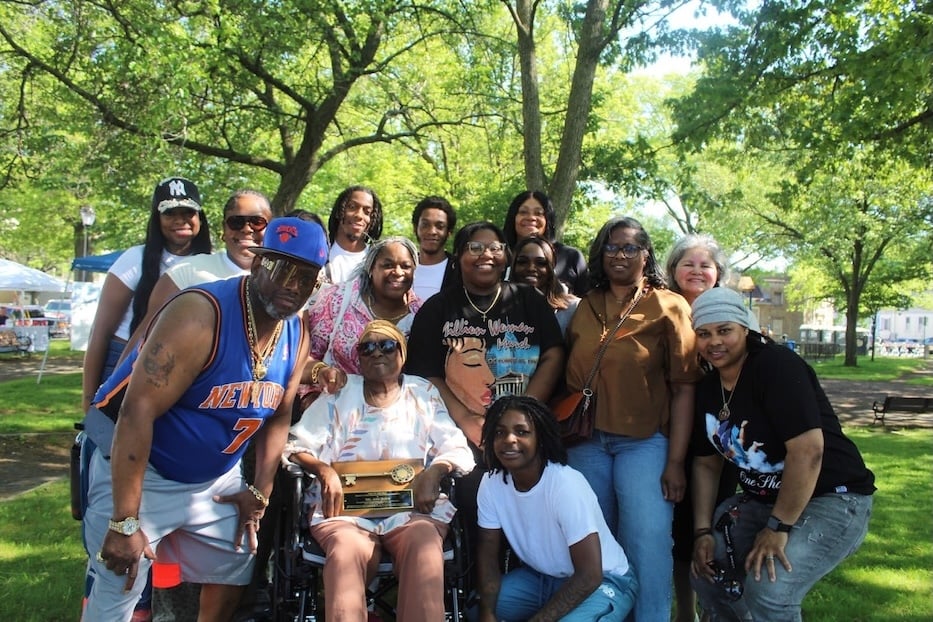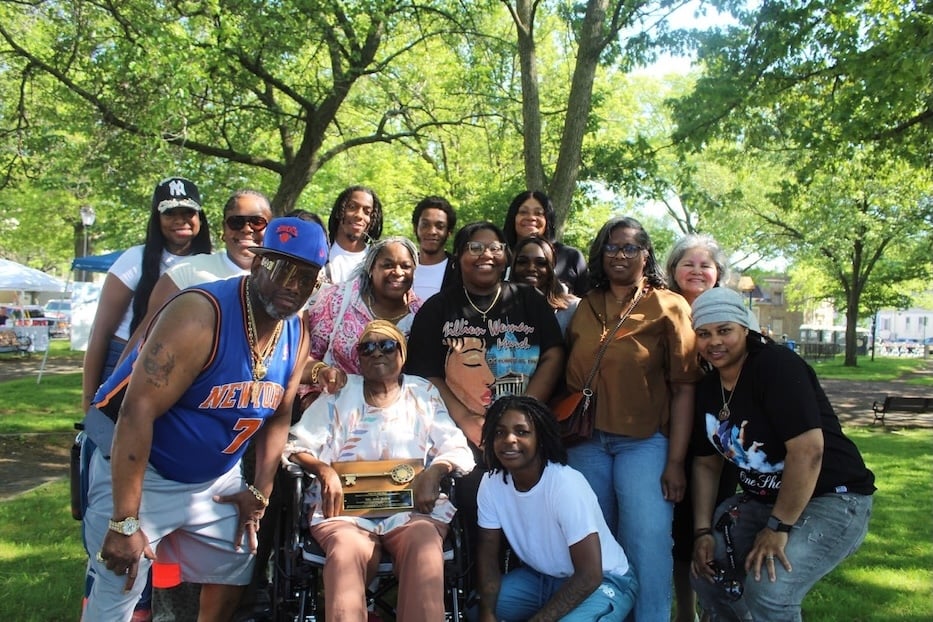
Culture & Community | Arts & Culture

Boyd surrounded by members of her family in May 2025, while receiving recognition as one of The Hill's community heroes from the International Festival of Arts & Ideas. Abiba Biao File Photo.
Ann Boyd spent her life in service to others. Now, it's on the hundreds of New Haveners she cared for—so many of whom loved her as a friend, a mentor and a second mom—to carry that bright light into the city's future.
Boyd, a fearless and formidable matriarch who made the Hill her home, died last Thursday at 80 years old. For decades, she brought a spirit of community care to all that she did, from work with New Haven's chapter of the Black Panther Party to block parties and movie screenings for kids in the neighborhood. A funeral service is planned for Friday at the Star of Jacob Church in the Hill.
"She was a mother to the community, and not only just to the Hill community," said her son, Howard Boyd, one of six boys and three girls that Boyd raised while also caring for the neighborhood around her. "She was a mother to the whole city. She always brought that same attitude, that same energy, to what she did. She was all about families and she wanted to make sure we all were educated on how this world moves."
"Ann Boyd is an icon in the Hill neighborhood," said Dr. Pamela Monk Kelley, who grew up in the Hill and knew Boyd through her older sister, Edith Monk. "When she opened her mouth, she spoke the truth. She said it was proven that she was not afraid of the system, and she was always in the good trouble, That's what I really loved about Ann."
While Boyd was born in Charleston, South Carolina, New Haven was very much her adopted home. In the 1950s, Boyd's parents moved to the city seeking better employment opportunities, in what is now recognized as the second wave of the Great Migration. They settled in the Hill neighborhood, first on York Street and later on Columbus Avenue.
Boyd, who was still a young kid, attended the Prince Street School, where she and Fred Harris would later challenge and improve public education as co-founders of the Hill Parents Association.
"The Hill was a very nice place to live, for me as a child," she remembered in a 2021 video recording for the International Festival of Arts & Ideas, which later recognized her at a 2025 neighborhood festival. She was able to walk to school and to church. Yale-New Haven Hospital, then known as Grace Hospital and then Grace-New Haven Hospital, was a neighborhood institution. "Everything was very convenient."
As she grew older, her activism grew up with her. In the 1960s, Boyd worked with Harris to found the Hill Parents Association (HPA), a grassroots movement that called for stronger, less racist, and more culturally responsive public schools. By then, Black Power was on the rise across the country, and Boyd became active in the New Haven Chapter of the Black Panther Party, from free breakfasts on Dixwell Avenue to a house at 35 Sylvan Ave. that was ultimately razed in 2008.
She settled in to a home on Ward Street when she started raising a family of her own. Through her nine children, Boyd became a fierce advocate for public education ("it was very old schools at the time, and I began to get involved," she remembered in the 2021 video), a stronger welfare system and housing assistance. In addition to organizations like the Panthers and the HPA, she became an integral part of groups like the Columbus West Tenant Association and Project MORE.
While she rarely said as much explicitly—she didn't have to, because of how loudly her actions spoke—Boyd instilled in her children the importance of service. When they were young, she made sure they learned by doing, whether it was feeding a neighbor (or ten) who needed a meal before school or showing up at a city meeting that had otherwise flown under the radar.
Howard Boyd, who is now 62 years old, can still remember the Easter Egg hunts and Christmas parties she planned for the neighborhood, always certain that she needed extra food, or extra school supplies, or extra winter coats to keep the Hill safe. Until it closed, Boyd also arranged weekly screenings for kids in the neighborhood at a movie theater that sat at Baldwin Street and Davenport Avenue.
"Her thing was always to stand up and keep fighting for what would be good for your families, to help families stay together, to help families stay together as a village," Howard remembered in a phone call Wednesday afternoon. "She worked with everybody. Every color, race that you could think of. She would never turn her back. She always instilled in us, no matter what a person's situation is, lift them up. Give them a second chance in life."
She also wasn't afraid to stir the pot, and did so across multiple mayoral administrations and chapters in the city's rich and layered history. In the early 1980s, Boyd moved her family into the West Street Apartment Complex (now referred to as Columbus West), making history as the first family to live there (in the preceding decade, she had worked with both private developers and the city's Board of Alders to make it happen; read more about that here and here).
At Columbus West, she became a steadfast advocate for better housing conditions, advocating for the remainder of her life. It was never just about her and her family, she was quick to say: she believed that safe and equitable housing was a basic human right, and raised her voice to say it many times over. That was true for many things: food security, anti-poverty initiatives, public education, and the decisions that are often made in and around communities of color without their residents in the room.
Maybe for that reason, she was known and loved well beyond a single block or even a single neighborhood. Howard, who now serves as the president of the Hill South Management Team, remembered how often the Boyd kids would share their apartment with other kids and families, whether it was for a warm meal before school or a meeting around the May Day protests that shook New Haven in May of 1970. That warmth extended to touring musicians, who knew that they could count on Ms. Ann for a warm meal and a conversation that reminded them of the purpose and value of Black art.
"My mother's door stayed open. She always let you come in. She always made sure that you ate, "Howard said. Neighbors weren't the only ones to stop there: he remembered visits from musicians Biz Markie, Kid Capri, and Big Daddy Kane that would often lead to tour buses parked outside of their apartment. His mom remained especially close with the late Afeni Shakur, a friendship forged through activism, until Shakur died nine years ago. "Everybody knew that they could go to Ann's house. "
Leslie Radcliffe, who met Boyd when after she bought her home in 2009, also saw that fierce love for the Hill community in action. In 2010, Radcliffe appeared before the city's Board of Zoning Appeals to testify against a proposed ice cream shop at 10 West St., close to where she had moved in on Truman Street. Boyd, who by then had lived in the neighborhood for six decades, called her to ask who she was an what she was doing.
It was before Radcliffe had helped found the Truman Street Garden and become an advocate of the neighborhood, and she realized that Boyd wanted to know exactly who this new neighbor was.
"She wanted to know about me, and she would make herself available," Radcliffe remembered. "She would say, 'I hope that you like me, but I don't care if you don't.' And she stood on business."
Radcliffe ultimately won her over, in part because she organized a trash cleanup on Truman Street that showed her budding care for the neighborhood ("Sometimes, you just need to pick up the street," she said matter-of-factly in a phone call last week). When Radcliffe joined the New Haven City Plan Commission in 2013, Boyd gave her historical context for the neighborhood, including the Hill's recent struggles with eminent domain. She called her up to ask what was coming to the meetings each month. Radcliffe was always grateful to hear from her.
"Ms. Ann was hard but she was also sweet, in if she liked you, you knew she liked you," Radcliffe said. "I think she liked me, and I'm hoping it was because of my commitment [to the Hill] and my advocacy ... Her strength and her advocacy were something that I greatly admired, whether I agreed or not."
Even as Boyd grew more frail in the last decade of her life, she never stopped advocating for the Hill, and for historically under-resourced communities more broadly. When Monk-Kelley became co-chair of the Hill North Management Team eight years ago, she quickly learned that Boyd was a source of both deep kindness and local history, whether she was telling stories of the Hill Development Corporation or pushing back against the APT Foundation, a methadone maintenance clinic, on Congress Avenue.
Before Boyd became too ill to be mobile, Monk-Kelley also had the chance to walk with her through the neighborhood, and sit down to speak with her about her own history. That interview will likely be released later this year.
"She loved her family, loved the hill, she would fight for whatever she believed in," said Monk- Kelley.
Maybe for that same reason, Boyd received some of her flowers this and last year, before she passed away. Last year, Boyd's name joined a recognition of the Hill Parents Association as organizers commemorated activist Fred Harris downtown at City Hall, and then named a corner in his honor earlier this month.
Then in May, a Hill neighborhood committee worked with the International Festival of Arts & Ideas to honor Boyd at a now-annual neighborhood festival where she had been a featured speaker just years earlier. Sha McAllister, associate director of education and community impact at the Festival, said she is so glad to have met Boyd and been able to recognize her as a history maker and culture bearer before her passing.
"Somebody like Ms. Ann, a lot of things in the Hill wouldn't be there without her," McAllister said. "It was an honor to be able to help honor that work. It's a duty that we have. "
A funeral service for Ann Boyd is planned for Friday Sept. 19 at the Star of Jacob Church, 506 Howard Ave. in New Haven at 11 a.m. This article includes previous reporting from Abiba Biao and Emani Servance.

